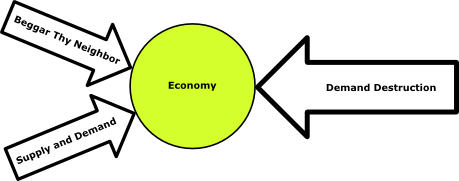Political arguments over economic theory seem to argue over whose economic theory is right. This argument really does not take into account what economic theories are all about.
For the purposes of this discussion I happened to choose the theories mentioned in the post Eurocrisis: “Democracy is Not a Given”. The figure below shows, graphically, how these theories relate to each other.
Macro economic theories focus on particular forces that move the economy. In any historical period when one theory seems to explain where the economy is going, the particular force of that theory may be so dominant, that other forces don’t matter much.
In a particular historic moment, if one force dominates, you still have to figure out which force it is so that you pick the right theory to apply to explain what is happening.
In real life, there are many forces pushing in different directions. You can see from the figure that you could actually pick the wrong force, supply and demand instead of all three, and get pretty much the right result. That might be okay for a while, but as the sizes of the forces change over time – beggar thy neighbor runs out of steam, you might have a hard time figuring out what is going wrong if you base your thinking on assuming that your wrong original choice was right.
Since there are many more forces that can be identified than the three that I have shown, it may be hard to say which one or ones, if any, are dominating. If you want to consider all possible forces and apply them in the proper strength, the calculation of where the economy is going to go becomes very difficult. This is where you might want to resort to computer modeling so you can have the computer make the difficult calculations.
A computer model is only as accurate as the completeness of the forces included in the model and their accurate measurement. The model also has to have an accurate representation of the economy, which is the object that these forces are moving.
Now imagine that the economic policy of the federal government is determined by the political process. Do you think the average lawyer or business person in Congress is capable of doing these calculations, or even understanding them?
Let us look at a similar situation decided by Congress successfully. One example that I can think of is the NASA moon missions. The Congress and President Kennedy decided on a destination. They created legislation, set up an agency to carry it out, and provided a budget. Congress did not legislate the size of the rocket, how many stages it should have, nor the details of the decade long research that would have to go into deciding these things.
As with a space mission, you cannot decide how to direct economic policy without first figuring out what the destination should be. The economic destination has to do with things like the rate of improvement of the lifestyles you want for your citizens, how competitive you think you have to be compared to other world economies, the level of economic security that people should feel, the cleanliness of the environment they should enjoy, and the sense of justice that is right.
Once you know where you want to go, then you can set up agencies filled with experts who can figure out how you can get there. You need to give the agency a budget. You also need to figure out how you are going to measure progress to your destination. You then set the agency to its task, and leave the details to them. Of course you keep monitoring progress and make adjustments to the agency to make sure it is working. However, you do not meddle in technical details if you do not have the expertise to do so.
If we all have a clear picture of the expertise that is needed to make these detailed decisions, then it is easier to know if the person who wants to meddle is qualified. It is also easier for the person who wants to meddle to know if she or he has adequate expertise to do it.
I think it is less than helpful for the general public to be arguing over whether Keynesian economic theory is right or the Austrian Theory is right. It is not the right question to even be trying to decide. The real question for the public to decide is whether or not we have the right destination in mind and whether or not we are making good progress toward that destination. It takes a fair amount of expertise to even get those issues right.
